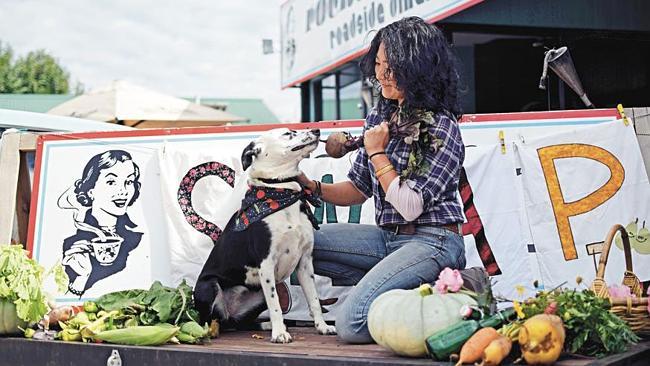Crop swap: Robertson gets together to share food, lives
Locals at a NSW town meet weekly to swap their home-grown produce. It’s part market, part social catch-up.

As the daughter of the local doctor, Pi Wei Lim knows better than most that in small rural communities, medical practitioners give medicinal expertise and offer therapeutic and emotional succour too.
A yoga instructor and practice manager at her father Ben Lim’s surgery in Robertson, a small town of nearly 2000 in the southern highlands of NSW, Lim has her finger on her community’s pulse.
It was for this reason she founded Robertson Alternative Local Food Exchange, known as “crop swap”. This weekly hour-long event sees local green thumbs share any glut of homegrown produce in exchange for whatever a neighbour turns up with that may take their fancy.
Held every Saturday morning, crop-swap members bring along their seasonal fruit, veg, flowers, seeds, herbs, and plants, all grown in backyard plots and gardens, and display them on the back of a pick-up truck parked outside local diner Rockabellas.
“I started a page on Facebook to share gardening information, which began to garner public interest,” says Lim, who grows biodynamically on her family’s 40ha farm a few kilometres away.
“Things like ‘are you having trouble growing your tomatoes’ and other handy gardening hints people locally were happy to share. However, after about three months, as it was coming into spring, we had more and more people joining the page, so I suggested we all meet and share our excess, and the idea sort of grew roots and flourished from there.
“The concept is simple. Provide a time and a space and ask people to bring along some homegrown produce, put in on the back of the truck, take some off. If you don’t have some to bring every week that’s fine. You can still take some.”
One year on, the event has become much more than well-meaning gardeners sharing their abundance, she says. Part farmers market, part social catch-up, Robertson’s crop swap is riding the wave of a global zeitgeist as similar homegrown exchanges sprout from Kiama to Melbourne, from Taranaki, New Zealand, to Nashville, Tennessee, and Orange County, California, in the US.
As the name suggests, the event is an exchange of goods. Money never changes hands, nor is any consideration given to value or weight of what is given or taken, Lim says.
And while the byproduct of such an event is “growing and eating local”, and “empowering local people to take their backyard gardens seriously because at heart we can all grow things and be farmers”, the real benefits go much deeper.
Lim says each market is helping build community cohesion, with relationships forged over a love of fruit and vegetables providing a sense of community connectedness and belonging.
“Crop swap is as much a social outing as it is a public-health initiative, although I don’t really go around announcing ‘oh, crop swap is a public health initiative’, but to me that’s an important part of it,” Lim says. “It’s a byproduct that actually becomes the main thing. There are some nice parallels with yoga.
“Many people initially approach yoga as a purely physical practice because they want a yoga body. But what they actually end up with is an amazing sense of wellbeing on so many levels.
“Crop swap is a bit like that. People come in through an avenue they can understand: to swap their vegetables. But that is the tip of the iceberg. From these regular meetings, connections and friendships and relationships are made, and then other positive things flow on from that.
“We are only a population of just under 2000 here so you can feel like ‘yes I know everyone in this town’. But there are many people who have lived here for many, many years, and may not know that many people. You can still meet someone who comes along to crop swap and you have never bumped into them there and suddenly it’s like ‘aaah. How long have you lived here?’ In our first year of crop swap I feel like I was the host at a party.
“To me, making good introductions to people and introducing community members to each other is really important. Everyone around here has an amazing story to tell and the important thing to do is to draw them out, and help them share them. Not just with me but with everyone.”
Backyard gardener Pip Hammond is a local primary school teacher and crop-swap regular.
“I think it’s the community aspect which so appealing to this crop swap,” Hammond says. “It’s not just about going and doing your own thing in your own garden any more, it’s about bringing along whatever you like and sharing, swapping knowledge and catching up over a coffee.
“Some mornings there are only a handful and other times there can be many here. Everything is grown locally by people who love their gardens and nothing is ever wasted. So as well as being a great initiative, it’s always a great place to be on a Saturday morning if you are around for an hour.”

To join the conversation, please log in. Don't have an account? Register
Join the conversation, you are commenting as Logout